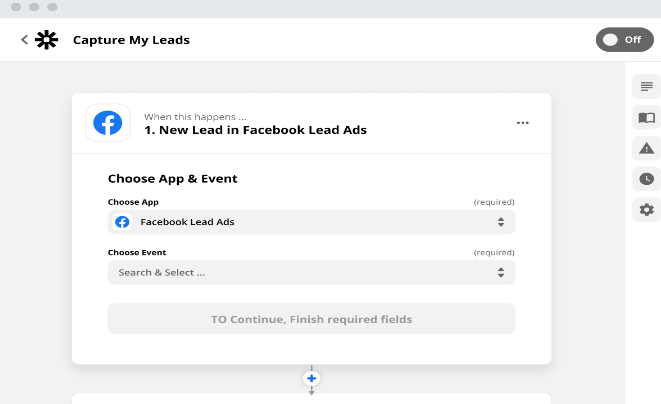Article URL: https://jobs.lever.co/jitxinc/3d62a65c-92c7-4996-82e3-0ff64e258d6b
Comments URL: https://news.ycombinator.com/item?id=33363971
Points: 1
# Comments: 0
Article URL: https://jobs.lever.co/jitxinc/3d62a65c-92c7-4996-82e3-0ff64e258d6b
Comments URL: https://news.ycombinator.com/item?id=33363971
Points: 1
# Comments: 0
Article URL: https://www.indeed.com/jobs?q=Kodable&vjk=cfd80509c01480ac&sc=0fcckey%3A49fe5ce38cf6d5e8%2Cq%3A%3B
Comments URL: https://news.ycombinator.com/item?id=31746017
Points: 1
# Comments: 0
Article URL: https://angel.co/company/kodable/jobs/1983277-senior-game-developer-unity
Comments URL: https://news.ycombinator.com/item?id=30388182
Points: 1
# Comments: 0
You may have heard of NAICS codes and SIC codes. And you may also have heard about how they can mark your business as low or high risk.
Today, let’s look at choosing the best NAICS code for you and how to do so easily. Since SIC codes are on their way out, we won’t look at them. But the principle is the same.
It’s a question of risk. More on that in a moment.
The North American Industry Classification System has industry codes to define establishments based on what they do most of the time. The codes sort businesses to gather, analyze, and then publish statistical data on the US economy.
For example, if your company is a salon, the code might be 812112, which is for beauty salons. But that’s not quite right if you have a nail salon, which should use 812113 instead.
For salons, there are only a few possible codes, corresponding to various services. A salon offering services for hair, nails, and permanent makeup could choose from three codes.
Lenders, banks, insurance companies and business CRAs use SIC and NAICS codes. They want to see if your business is in a high-risk industry. So you could get a denial for a loan or a business credit card based on your business classification. Some codes can trigger automatic turn-downs or higher premiums. Or your business might receive reduced credit limits.
The IRS will use the code you pick, to see if your business tax returns are comparable to other businesses in your industry. If your tax deductions do not reasonably resemble other businesses in your industry, your business could be subject to an audit.
Furthermore, some companies get a high-risk label when they do not choose the right code. But if you get how the classification system works, then you can choose the right business NAICS code on your first try.
The riskiest businesses tend to be cash-intensive. Or they can be businesses with a higher chance of personal injury or property damage.
The NAICS keeps a list of high-risk and high-cash industries. Industries on the list include casinos, pawn shops, and restaurants. Before you choose a code, look over the list.
But keep in mind, that list of high-risk and high-cash industries is from 2014 and may be incomplete or even out of date. Per the NAICS, there are no plans to update it at this time.
OSHA also requires injury and illness reports from certain high-risk industries.
None of three salon codes are on the list. But this doesn’t mean they shouldn’t be. After all, salons harbor any number of hazards. Wet floors from dripping towels can make a floor slippery. Curling irons and hair dryers are sometimes too close to wash basins. Shampoos, dyes, and nail polish remover can cause allergic reactions. And a rough masseur can injure a customer’s back.
But the other side of the risk coin is occupations which are cash intensive businesses. A pawn shop might not have much of a specific risk of injury at all. But the large amounts of cash normally associated with one mean that it’s a tempting target for thieves.
Experian in particular tends to mark certain industries as high risk when they aren’t cash-intensive. And they have no physical plant where anyone can get hurt (such as is the case with purely online businesses). So, what gives?
There are a few reasons.
Here’s how to get a code for your company:
Yes, you actually can. Keep in mind, it’s not exactly a list of companies by NAICS code. Which makes sense, as the NAICS would probably prefer selling something like that. However, if you go to the NAICS Company Lookup Tool, you get a few options.
You can look up a company if you have their name and ZIP code, or you have their name and D-U-N-S number, or their name and complete address.
As a result, I was able to look up Apple’s NAICS codes (their headquarters in Cupertino, California has a ZIP code of 95041. Hence if you were Tim Cook, and were asking, “What is my NAICS code?”—that would be how you would get it. But they won’t let you conduct more than one search without paying.
For our salon example, it’s hard to say which code is best. Chance are they are all equally risky. Of course you want to be honest when picking a code. But if more than one code could apply, it’s okay to choose a code which will not get you denied by lenders.
If you make your own conditioner and the like, that may turn out to be a better code, 325620. That way, you may be able to still operate your real salon business without being considered risky.
A better code can be the difference between business funding—and no funding.
It matters less than you may think. If traditional lenders will say no, then it’s time for some internet sleuthing. A quick Google search for business loans for salons pulls up over seven million hits. You don’t have to get money from a traditional lender.
But check a few things, e.g.:
And then proceed as you wish. If you’ve found a reputable lender and they don’t care about SIC and/or NAICS codes, then the codes kind of don’t matter….

Your NAICS code is a part of the calculus of fundability of your business. Lower-risk codes will tend to be better. But if your business has several other positive fundability
of your business. Lower-risk codes will tend to be better. But if your business has several other positive fundability factors, the code matters less. A well setup business with $2 million in sales every month should be able to get money no matter what their code is.
factors, the code matters less. A well setup business with $2 million in sales every month should be able to get money no matter what their code is.
Choosing the wrong code could end up costing your business and get you labeled as high-risk. This could directly impact your insurance premiums. It could affect your financing ability, even your credit limit recommendations. This small error of selecting the incorrect code could have a big impact on your business in the future. Always do your research before choosing.
Here are some examples of industries considered high risk.
The post How to Choose the Best NAICS Code for Your Business appeared first on Credit Suite.
While you once had to be fluent in code to successfully build a website or an app, those days are now far behind us.
How?
Thanks to no-code creation tools.
These revolutionary interfaces allow users without classic programming backgrounds to build websites and apps through a graphical interface rather than using code.
The utility doesn’t stop there: No-code tools can help entrepreneurs and marketers achieve feats that in the past were reserved exclusively for programmers.
These tools also support automated processes, allowing organizations and individuals to save time by automating time-consuming tasks.
What’s better than time saved?
Money saved.
By eliminating programming fees and reducing billable hours spent on tedious processes, you can drastically reduce your costs.
Want to learn more?
In this post, we’ll unpack the 10 best no-code creation tools and what they can do for you.
The short answer: everyone.
If you don’t have a background in writing code or app development, don’t fret.
No-code tools provide users with visual interfaces that eliminate the need for a seasoned code writer.
Perhaps you want to launch a new personal website but are intimidated by the process behind the layout. There’s a no-code tool for that.
By using these tools, you can take website or app creation into your own hands, whether you’re familiar with code or not.
Even if you are familiar with code, these tools can help you automate tedious processes that bog down your daily workflow.
While we’ve already covered the obvious benefits of code-free creation tools, there are several other benefits to these tools that can have an impact on your business.
Rather than spending excessive amounts of time trying to find and hire the right programmer, you can focus on honing in on the true value of your app for your customer by identifying and speaking toward their pain point.
When you opt to use a no-code creation tool, you can plan to save a substantial amount of your budget previously dedicated to development needs. With low or no price points, these tools can make a significant difference in your bottom line.
Not only will you save money when you use a code-free creation tool, you’ll also save time. Developing custom websites and apps is hard and time-consuming; using a tool with prebuilt templates is easy and saves countless hours.
Regardless of what you’re building, a secure environment should be of the utmost importance. When you use no-code creation tools, safety nets are prebuilt into the platforms, allowing you peace of mind.
There are a lot of no-code creation tools out there, all with different functions for different user groups. We picked out our top 10 favorites that help solve specific needs without having to write a line of code.
When you use Bubble, you gain the ability to craft interactive apps for both desktop and mobile browsers.
With Bubble, you get design freedom without having to wrangle the intricacies of code.
While traditional web applications require a manual deployment process, Bubble manages deployment and hosting. The platform also offers limitless users, traffic volume, and data storage.
In short, this is your go-to for building production-ready apps.
We’re fans of any tool that enhances connection and automation, which is why Zapier is on this list. With this tool, you can connect the apps you use daily.
Through “Zaps,” users sync Gmail with Dropbox, Dropbox with Slack and so on.
If you don’t use the above apps, don’t worry. Zapier connects thousands of apps.
By building these connections, workflow is simplified, saving you time and eliminating unnecessary processes.

This one is pretty cool. Stacker allows users to turn spreadsheets into apps, enabling you to securely share data with customers.
This lets you turn manual processes into automatic ones, streamlining onboarding and applications, enabling real-time collaboration, and ensuring secure file upload.
In essence, Stacker supports automation and collaboration through an easy-to-use, app-like interface that does all the coding for you.

In need of a voice or chatbot? Voiceflow should be your go-to no-code creation platform. Regardless of what channel you’re using to reach your audience, Voiceflow designs, prototypes, and launches conversations for any channel.
With Voiceflow’s unique functionality, you can build engaging, contextually-layered conversation and voice apps to create an always-on interaction for your customers.
Additionally, you can standardize approach across sites, projects, and channels with the tools’ simple duplicative ability.
BugHerd helps you aggregate and implement website feedback.
This easy-to-use tracking tool enables users to instantly identify bugs through a visual component similar to a sticky note.
Comments will be pinned to the buggy element, allowing you to address issues directly from your website.
This tool also allows users to track given feedback on a list of bugs, ensuring you resolve issues as they arise.
Functionality includes adding comments, ranking bug severity, bug assignment, and report generation.
Perfect for the coder and non-coder alike, this tool makes bug removal a breeze.
This easy-to-use website builder provides users with countless aesthetic templates to build the site of their dreams.
Whether you’re setting up a third-party extension or starting an e-commerce store, SquareSpace provides users with access to designer fonts and color palettes to allow for endless customization.
Equipped with an intuitive dashboard, SquareSpace also allows users to track visitors’ behavior and origin, allowing for a better understanding of the audience.
Once you’ve identified that audience, the platform comes equipped with social tools and email campaign builders to help you stand out among the crowd.
This tool allows you to segment your website for different member groups.
Offering paid courses or video tutorials? Restrict access to payment groups with easy-to-use MemberSpace.
With MemberSpace, site owners control all member experiences, since members never move to an external site. They can login, manage access, and interact with content all from the safety of your site.
MemberSpace works across the content management system (CMS) tool continuum, so if you change platforms, you don’t have to change functionality.
Additionally, and perhaps predictably, given the tool’s purpose, users gain access to a private community that hosts conversations centered on the tool and membership topics.
This online database allows collaborators to edit, store, and share information, whatever the term information means for the particular user group.
With similar functionality to an editable, online spreadsheet, users are invited to interact with Airtable.
While this tool may sound like other online spreadsheets, it has two distinct differences.
First, it’s easy-to-use nature instills in novices and experts alike feelings of proficiency.
Second, Airable allows users to manage databases, not sheets. Given the complexity of databases, the ability to handle them through simple, streamlined workflows is a boon to collaborative teams.
What’s more, the tool Airtable grows in tandem with teams, allowing increasing levels of sophistication as team needs evolve.
Is your workflow bogged down by time-consuming manual processes?
If you answered yes, Parabola might be your new best friend.
This handy tool automates any task you can do in a spreadsheet.
Save time, reduce errors, and boost efficacy through automation. By using the tool’s drag-and-drop builder, routine reports and complicated tasks are all automated, allowing you to focus on what really matters: growing your business.
Wading into the world of e-commerce? Payhere can help you get paid anytime, anywhere.
This no-code creation tool enables you to send a simple link across any medium (think video call, social media, email) and get paid.
The tool also features both one-time and recurring payments, making it easy for consumers to set up their payment schedules.
In addition to the overall payment functionality, Payhere allows users to create a simple, one-page storefront where all your payment links can be displayed. You can link to this storefront from your social platforms or in your email signature.
This simple tool is a must for you sellers out there.

It makes sense that the demand for low- and no-code tools will continue to grow since usage doesn’t demand extensive background.
In fact, Research and Markets reports the low-code market could be worth upward of $187 billion by 2030.
As the market for these platforms continues to skyrocket, here are the top three trends users of these tools should anticipate in the coming months and years:
As more and more consumers move away from traditional programming, you can anticipate increased availability and adoption of both no- and low-code platform models.
With the profusion of no-code tools with functionality to automate cumbersome, manual processes, expect to see a much more streamlined workforce.
While developer teams have historically been made up solely of programmers, the rise of code-free creation tools is driving a more blended development team. By combining traditional coding with tools, organizations can build custom websites and apps that are created with a variety of different expertise.
Want to build an app, website, or other digital asset but don’t know how to code? Here are 10 tools to try.
Your go-to tool for building apps for desktop and mobile.
Connect apps, tools, and other programs to streamline your workflows.
Turn spreadsheets into apps and automate processes like onboarding and apps.
No-code chat bot or voice bot creator.
Better understand web feedback with this easy-to-use tracking tool.
Build and launch your website in minutes with no coding experience.
Control the membership experience by integrating with your CMS>
Online data base that makes storing, editing, and managing information easier.
A handy tool to automate tasks from a spreadsheet to reduce errors and boost efficiency.
Get paid fast with a one-page storefront.
Regardless of where you work or what you do, it is inarguable that some function of your life can benefit from the offerings of the above 10 tools.
You no longer need a background in programming to accomplish your digital goals. As you start your next digital marketing campaign, ask yourself: Which processes can I automate to reduce manual workload and increase focus on overall success?
By answering this question, you’ll be able to isolate areas for improvement, optimizing your strategies and reducing manual processes.
What’s your favorite no- or low-code creation tool to use?
Article URL: https://triplebyte.com/company/public/kodable/Ll0usuE/senior-software-engineer
Comments URL: https://news.ycombinator.com/item?id=26582651
Points: 1
# Comments: 0
Article URL: https://angel.co/company/kodable/jobs/925512-senior-game-designer
Comments URL: https://news.ycombinator.com/item?id=24528814
Points: 1
# Comments: 0
The post Kodable is hiring a Senior Game Designer to help teach millions of kids to code appeared first on ROI Credit Builders.
Article URL: https://angel.co/company/kodable/jobs/925512-senior-game-designer
Comments URL: https://news.ycombinator.com/item?id=24528814
Points: 1
# Comments: 0
Article URL: https://angel.co/company/kodable/jobs/925512-senior-game-designer Comments URL: https://news.ycombinator.com/item?id=24264402 Points: 1 # Comments: 0
The post Kodable is hiring a Game Designer to help us teach millions of kids to code first appeared on Online Web Store Site.